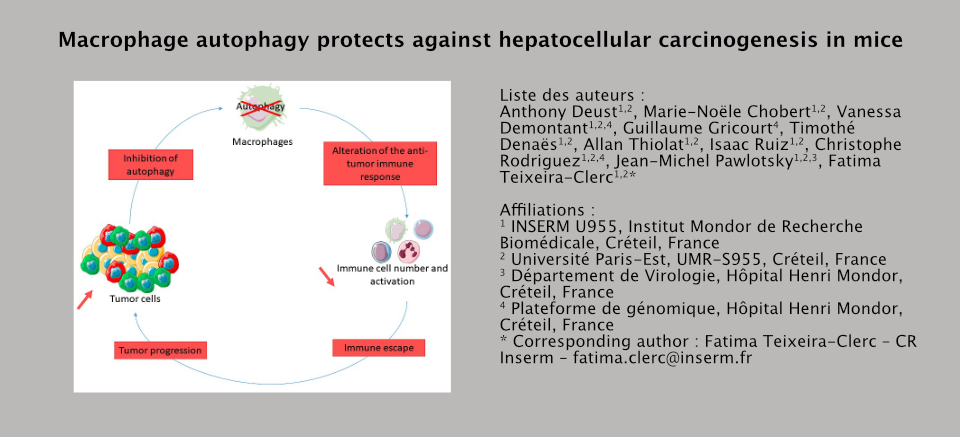Macrophage autophagy protects against hepatocellular carcinogenesis in mice
Authors
Deust A, Chobert M-N, Demontant V, Gricourt G, Denaës T, Thiolat A, Ruiz I, Rodriguez C, Pawlotsky JM & Teixeira-Clerc F. Contact:Fatima Teixeira-Clerc – CR Inserm – fatima.clerc@inserm.fr
Link to the original articleYear of publication
2021
Journal
Scientific Reports
Abstract
Macrophage autophagy protects against hepatocellular carcinoma by regulating the immune microenvironment Hepatocellular carcinoma (HCC) is the most common primary liver malignancy. HCC typically develops on a background of chronic inflammation with macrophages playing an important role in this process. In this work, the authors observed that liver cancer cells inhibit autophagy in macrophages, a mechanism that is involved in the regulation of the immune responses. To investigate the consequences of macrophage autophagy inhibition on hepatocarcinogenesis, the authors exposed mice invalidated for macrophage autophagy (ATG5Mye-/- mice) to a model of hepatic carcinogenesis induced by administration of diethylnitrosamine (DEN). DEN-treated ATG5Mye-/- mice show enhanced tumor development compared to wild type mice. Characterization of the hepatic immune cell populations demonstrate that DEN-treated ATG5Mye-/- mice show a decrease in the number and the activation of hepatic macrophages and T cells. Moreover, a transcriptomic analysis using next generation sequencing shows that the hepatic macrophages isolated from DEN-treated ATG5Mye-/- mice exhibit a more immunosuppressive phenotype than the macrophages isolated from wild type mice. In addition, the authors show for the first time that autophagy regulates the expression of the co-inhibitory immune checkpoint molecule PD-L1 by macrophages: activation of autophagy reduces the expression of PD-L1 induced by tumor cells while inhibition of autophagy increases the expression of PD-L1. These results suggest the existence of a vicious circle in which tumor cells alter the tumor microenvironment by inhibiting macrophage autophagy leading to the overexpression of PD-L1, which, in turn, will promote tumor growth by inducing an immunosuppressive microenvironment.
Graphical abstract

Macrophage autophagy protects against hepatocellular carcinogenesis in mice